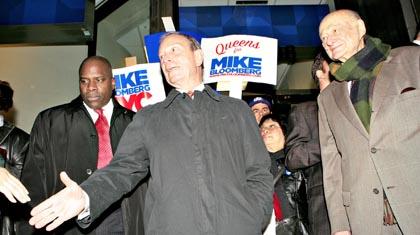By Anna Gustafson
Though Mayor Michael Bloomberg’s support from Queens voters dwindled this year compared to the last election, he still carried the borough — in part buoyed by individuals who came out to vote for the three Republicans who won City Council seats in Queens, Executive Vice Chair of the Queens GOP Vincent Tabone said.
The groundswell of support for Peter Koo, who beat Yen Chou; Dan Halloran, who defeated Kevin Kim; and Councilman Eric Ulrich (R-Rockaway Beach), who retained his seat in a race against Frank Gulluscio, seemed to have helped the mayor, the Republican nominee, in Queens, Tabone said.
Both Koo and Halloran won seats previously held by Democrats. Comptroller-elect Councilman John Liu (D-Flushing) holds the seat won by Koo and Councilman Tony Avella (D-Bayside) represents the district claimed by Halloran in a contentious race dominated by claims of racism and religious bias.
Bloomberg landed 154,127 votes in Queens, according to unofficial results from the city Board of Elections, compared to Thompson’s 120,754. That difference of about 34,000 votes is far less than the 90,000 votes Bloomberg carried Queens by in the 2005 general election.
“I think people in Queens want to see fiscal responsibility and responsible government,” Tabone said. “The reality is there’s another backdrop. There was a sense of inevitability that the mayor would be re-elected, which may have impacted turnout and lowered his numbers.”
Citywide, Bloomberg received 557,059 votes, and Thompson garnered 506,717 — meaning the mayor carried the city with 50.6 percent of the vote and Thompson landed 46 percent. Bloomberg’s victory was much closer than predictions of various polls, many of which had forecast a 12-point win on the part of the mayor, who spent about $90 million of his own money on his campaign.
“A lot of Queens voters were disaffected and turned off,” Queens Civic Congress President Corey Bearak said of this year’s mayoral campaign. “There was not enough attention given to issues like development, taxes and education.”
There were high-profile wins by Democrats in the city, including Liu for city comptroller — the first Asian to hold citywide office — and Councilman Bill de Blasio (D-Brooklyn) for public advocate. Both Liu and de Blasio garnered well over 100,000 more votes than Bloomberg.
But Parkside Group political consultant Evan Stavisky said support for Liu in Queens did not translate into more votes for Thompson.
“Liu’s presence on the ballot was far less relevant in this election than it was in the primary,” Stavisky said.
The state Assembly district that covers Flushing went for Bloomberg, and according to the Asian American Legal Defense and Education Fund the majority of the city’s Asian residents voted for Bloomberg.
AALDEF on Monday released its exit poll results of over 2,000 Asian American voters in Queens, Manhattan and Brooklyn and found that 62 percent of Asian Americans supported the mayor’s re-election.
Bloomberg’s support in Queens came primarily from the borough’s northeastern section and parts of the west, such as Astoria. Southeast Queens overwhelmingly voted for Thompson, as did parts of the west, including Woodside and Sunnyside.
Stavisky said there was nothing new or surprising about the breakdown of Queens’ vote, as the northeast tends to be more conservative than the west and south.
“By enrollment Queens is overwhelmingly Democratic, but it has a history of voting for people who are not necessarily Democrats,” Stavisky said.
Reach reporter Anna Gustafson by e-mail at agustafson@cnglocal.com or by phone at 718-229-0300, Ext. 174.



































